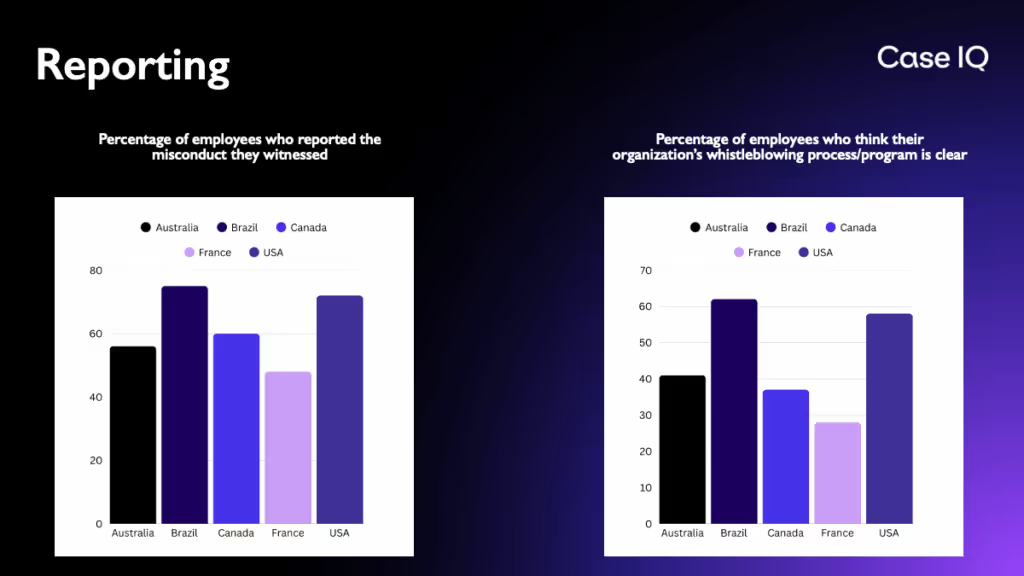Building Speak-Up Cultures: Lessons from Whistleblowing Leaders
Case IQ recently hosted a powerful discussion between Shannon Walker, Debra Sabatini Hennelly, and Sherron Watkins—three experts in workplace ethics and speak up cultures. Their conversation explored the state of whistleblowing programs worldwide (based on the results of Case IQ’s global whistleblowing survey), the importance of strong anti-retaliation protections, and how organizations can foster cultures where employees feel safe speaking up.
Get insights into employee whistleblowing in Case IQ's global report
Download our report to see how employees around the world really feel about reporting misconduct, protection from retaliation, AI whistleblowing tools, and more.
Download NowGlobal Whistleblowing Trends
The panel began by reflecting on findings from Case IQ’s employee whistleblowing survey covering Australia, Brazil, Canada, France, and the United States. Results showed that while many organizations have whistleblowing programs, far fewer employees feel comfortable using them. Even fewer believe they would be protected from retaliation.
Key insights included:
- Stronger reporting cultures in the U.S. and Brazil, where employees are more willing to raise concerns
- Weaker protections and awareness in Canada and France, where programs are less developed and processes remain unclear
- While not in the report, our experts discussed societal norms shaping reporting behavior, with Latin American employees more likely to embrace hotlines compared to their Asian counterparts.
These findings underscore the need for organizations to not only implement whistleblowing programs, but also invest in cultural change that makes them trusted and effective.

Retaliation: The Greatest Barrier
Retaliation remains the single largest deterrent to speaking up. In fact, in the U.S., retaliation is the most frequently reported form of workplace discrimination, surpassing race and gender. Both Hennelly and Watkins stressed that retaliation—whether overt or subtle—destroys trust and silences employees.
Organizations must therefore:
- Establish zero-tolerance policies on retaliation
- Include explicit anti-retaliation clauses in codes of conduct or employee handbooks
- Provide unique training modules for employees and managers on recognizing, preventing, and addressing retaliation in the workplace

The Enron Lesson
Watkins shared her personal experience exposing accounting fraud at Enron. Initially attempting to report concerns internally, she found her warnings dismissed, and later discovered that leadership’s first response was to consider firing her rather than investigating her claims.
She shares that the CEO at the time did not “investigate whether or not [she] could be right, whether we had cooked the books or manipulated the financial statements.” Instead, “it was whether he could dump me on the street with little or no consequence, and the plan of attack is to label me, or any other whistleblower, as a disgruntled employee who’s a bit of a nutcase, really to attack your credibility.”
This situation drove Congress to include whistleblower protections in the Sarbanes-Oxley Act of 2002, laying the groundwork for today’s reporting frameworks.
Her story illustrates why anonymity and strong internal reporting channels matter. As Watkins explained, a two-way anonymous portal allows employees to raise concerns and receive follow-up while protecting their identities. This is essential when those higher up in the organization may try to discredit their stories or retaliate against them.
Structuring Effective Reporting Programs
The panelists emphasized that whistleblowing systems must be secure, accessible, and credible. Best practices include:
- Two-way anonymous portals enabling secure communication with investigators
- Multi-channel intake options (hotlines, web portals, email, mail) in multiple languages
- Role-based access controls to protect confidentiality
Equally important is ensuring that compliance leaders hold real authority. Both Watkins and Hennelly argued that Chief Compliance Officers must sit at the executive table alongside other C-suite leaders, rather than being buried under the legal department.
“You’re supposed to be giving management advice about doing the right thing, living our values, living up to our policies,” explains Hennelly. “Sometimes the law and our policies don’t agree, and the law is the floor and the policies might be up here, or our values might be even higher. So, it’s the Chief Ethics and Compliance officer who can say, I know this is a legal risk, but here’s what can happen in our culture, or for employees who see us ignoring a problem or covering up a problem potentially.”
Rethinking the Whistleblower Label
The term “whistleblower” has historically carried a negative connotation, often associated with betrayal rather than courage. Hennelly suggests reframing these individuals as “reporters” or “upstanders”: people fulfilling their duty to safeguard organizational integrity. Watkins noted that many whistleblowers face career-ending stigma, reinforcing the importance of cultural shifts that celebrate rather than punish those who raise concerns.
Learn Speak Up Culture Best Practices
Listen to our audio blog to learn more best practices for implementing and maintaining your effective speak up culture.
Listen NowIncentives and Recognition
The panel debated whether financial incentives should play a role in encouraging employees to report misconduct.
While regulatory reward programs such as those under the Dodd-Frank Act have proven effective, our experts prefer non-monetary recognition within companies. Celebrating employees who exemplify ethical courage with awards, leadership acknowledgment, or peer nominations can send a powerful message that speaking up is valued and rewarded, without looking like a financial bribe.
Conclusion
Creating a speak-up culture requires more than policies. It demands leadership commitment, independent reporting structures, protection from retaliation, and a shift in how organizations view and treat those who raise concerns. As Watkins’ Enron experience and Hennelly’s decades of compliance leadership illustrate, whistleblowers are not adversaries to be silenced—they are essential guardians of organizational integrity.
By investing in trust, transparency, and recognition, organizations can turn whistleblowing from a last resort into a vital part of healthy corporate culture. Case IQ’s hotline and case management solutions can make maintaining an ethical culture easier; to learn how, book your demo now.
See why a whistleblower hotline and case management software are better together
Robust reporting mechanisms and an innovative case management platform can work together to help you handle incidents from start to finish, with confidence. Learn how in this eBook.
Download Now









